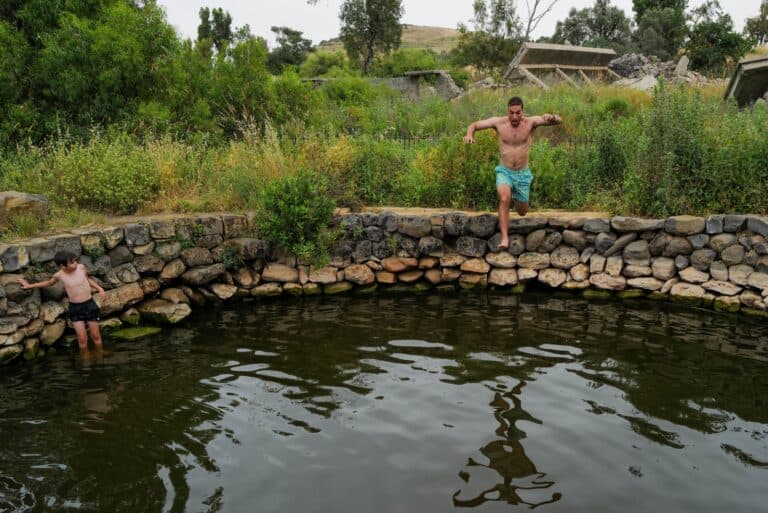The never-ending heatwave that is astonishing Israelis just now is not unique to this corner of the world. The southwest of the United States, parts of western Canada and Italy, Spain and Greece are all experiencing an inferno this summer.
But what can be unique, notes KKL-JNF Chief Scientist Doron Markel, is what Israel does about them.
“These last heatwaves have been breaking records, not only in terms of the temperatures reached, but also their duration,” Markel tells ISRAEL21c. “We’re familiar with heatwaves that last two or three days, not a week or two.
“This increase in frequency and strength is exactly the trend predicted by the models created by climate scientists. These models forecast a rise in frequency and strength of heatwaves, and it’s happening right now,” he says.
“The concentration of greenhouses gases – especially carbon dioxide but also methane and others – keeps on increasing in the atmosphere. This is because we humans have for decades been burning fuel made from organic matter that was created on Earth millions of years ago. We’re excavating it in the form of oil, gas and coal, and burning them for energy purposes. All this CO2 goes up into the atmosphere and amplifies the greenhouse effect.”
As a result, Earth is getting hotter.
“The average increase is by 1.4°C, which doesn’t sound like a lot, but it’s the increase across the globe and all seasons. This means that in certain areas, the summer becomes hotter, and now we’re experiencing that in the summer of the northern part of the globe.”
Let’s get our act together
To minimize greenhouse gas emissions, Markel notes, the world needs to get its act together and combat them with all means possible, including technology.
“Otherwise it will continue to get hotter, and the climate will continue to be extreme. This is already lethal; people are already dying from it all around the world. It will only get worse,” he says.

In 2021, Israel was among the countries that participated in COP26, the United Nations Climate Change Conference. Ahead of the conference, it pledged to cut 30 percent of methane emissions by 2030 and to become carbon-neutral by 2050.
Markel is all for these reductions, negating the idea that Israel’s small size exempts it from joining the effort to offset the world’s carbon footprint.
“Some people are saying, ‘What do you want from Israel? It’s a small country whose emissions really won’t affect the world’s emissions,’” he notes.
“Well, Israel really is a small yet densely populated country and yet, despite the small number of people, the ratio between the size of the population and the emissions is high. It cannot say that because compared to the US, Russia, China, India or Brazil its emissions are relatively low, it can be exempted from the requirements regarding carbon neutrality.”
The role of forests
Unfortunately, Markel adds, it doesn’t seem like Israel will be able to meet the standards that it set for itself.
“We need to move to renewable energy sources much faster, and to minimize emissions at a much higher speed,” he laments.
The KKL-JNF is the body in charge of Israel’s forests, and as such has a role to play in mitigating the effects of climate change.
“Forests are the main tool to absorb carbon emissions in Israel,” he explains. “There are more emissions than the forests can now absorb, but we have no other tools to absorb them.”
Another area that requires attention, he says, is renewable energy sources, and in particular solar energy.
Markel notes that storing solar energy and the vast amount of space required for producing it are two challenges that have to be addressed. Non-lithium storage solutions and agrivoltaics – where spaces are accorded dual use for farming or landscape and energy production – are interesting directions being taken in Israel.
Lab for climate change
“Israel can serve as a kind of lab for climate change, because not too far away from each other we have Mount Hermon that’s two and a half kilometers high and enjoys 1,200 to 1,400 millimeters of rain and snow, and desert areas that experience less than 50 millimeters of rainfall per year,” Markel tells ISRAEL21c.
“As a result, you can see climate change really well in Israel, and you can examine different tools or the special effects that it has,” he adds.
“Also, like the rest of the Middle East, Europe and the US Southwest, Israel is a hotspot that heats up more than the rest of the globe, so it’s a place that can be of help to understand the processes taking place and developing world-changing technologies.”

Another advantage, says Markel, is that Israel is the Startup Nation and is in the process of becoming the Climate Nation.
“There’s a lot of innovation here that is heading more and more in the direction of climate, both in terms of startups and academia, and more technological solutions are being introduced,” Markel notes.
“This is the place where Israeli abilities in research and the startup world, combined with Israeli chutzpah, can be manifested in the form of very interesting solutions,” he concludes.
“Like the solutions that we brought to the cybersecurity world or even the world of irrigation, I can definitely see Israel bringing forward the technology that will become a climate gamechanger.”

















